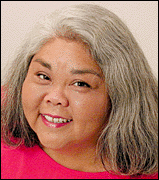


![]()
Under the Sun
An idealistic bloom can
cut through the gloomWHY, the young woman asked, had degradation of Hawaii's waters and land been permitted? Why hadn't anyone objected before?
"I guess it's up to my generation to stop this. We can do it," she said, her wholesome face radiant with hope, her voice ringing earnestly through the meeting room.
"Right on," I muttered peevishly under my breath. "Power to the people."
The young woman and I were among a group of people listening to a government official talk about environmental problems and the measures, few and feeble, being taken to counter the deterioration. Through the presentation, I had grown dispirited as I often become when reminded of the enormous difficulties Hawaii, as well as the rest of the country, confronts in beating back the powerful forces that veil the desire for higher profits in "doing good" for the economy, forces that see environmental evaluations as a short-term bureaucratic hassle rather than an obligation to the future.
My sarcastic growls reflected frustration, but they should not have been directed at the 20-something. It's just that her statement was so familiar, uttered by time-distant voices of other generations. Her youthful idealism, rosy and bright, had yet to be darkened by cynicism.
It's hard not be cynical these days. The most recent crankings were fueled by Trent Lott's segregationist remarks at the birthday party of a Senate crony. During a discussion on PBS's "The News Hour," one of the political analysts -- the skinny one with glasses -- observed that those who wanted Lott pitched as majority leader were sincere, but sincerity had nothing to do with the situation. The overriding concern was the image Republicans would now have to correct. When the other analyst -- the chubby one with glasses -- said he hoped the GOP would use the occasion to weed out racially insensitive elements of the party, the skinny one called him "a bit of a Pollyanna." Not going to happen, skinny said.
Well, geez, as unrealistic as the chubby one's thoughts may be, it would be nice if there were a few more Pollyannas in the world. At one time, Ben Cayetano was one. In a rambling interview before he left office, Cayetano said something that struck me as sad. There are few people in elective politics, he said, who captured the idealism of his youth. The harsh realities of politics eventually tamps down idealism, but he thought the fledglings would at least start off with stars in their eyes. He said his age and experiences had likely skewed his view, but he hoped he was wrong.
In the news business, when the job is to chronicle misfortune and misadventures of evil-doers, maintaining an optimistic outlook is difficult. In fact, cynicism is almost the byword of the profession. Still, telling readers about people who do good things is restorative. Even more so are encounters with benevolence among those who don't get their pictures in the paper and who spend their lives below the hero radar helping others.
A few months back, a colleague and I debated a localism often seen on tank tops and T-shirts: If can, can. If no can, no can. He interprets the sentences as an attitude about how things in Hawaii don't work as they should -- never have, never will. Not, I said. The "no can, no can" part is about being realistic, acknowledging that some things are unachievable. But the "can, can" factor echoes the idealism that prevails in the islands, somewhat quixotic and romantic, somewhat visionary and all components of a belief that the quest for goodness is still alive.
I see vitality in being idealistic, even under the weight of cynicism. That young woman's words resound, particularly today. She can.
Cynthia Oi has been on the staff of the Star-Bulletin for 25 years.
She can be reached at: coi@starbulletin.com.